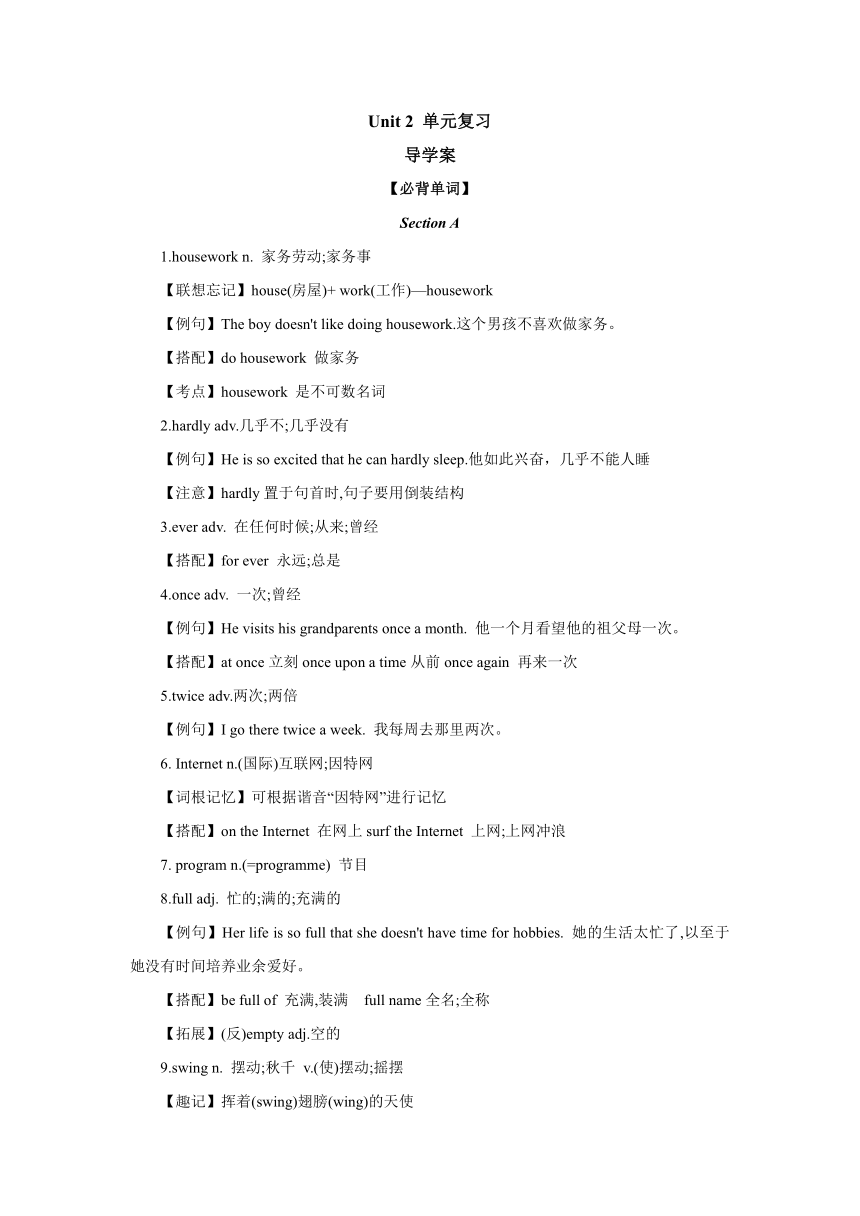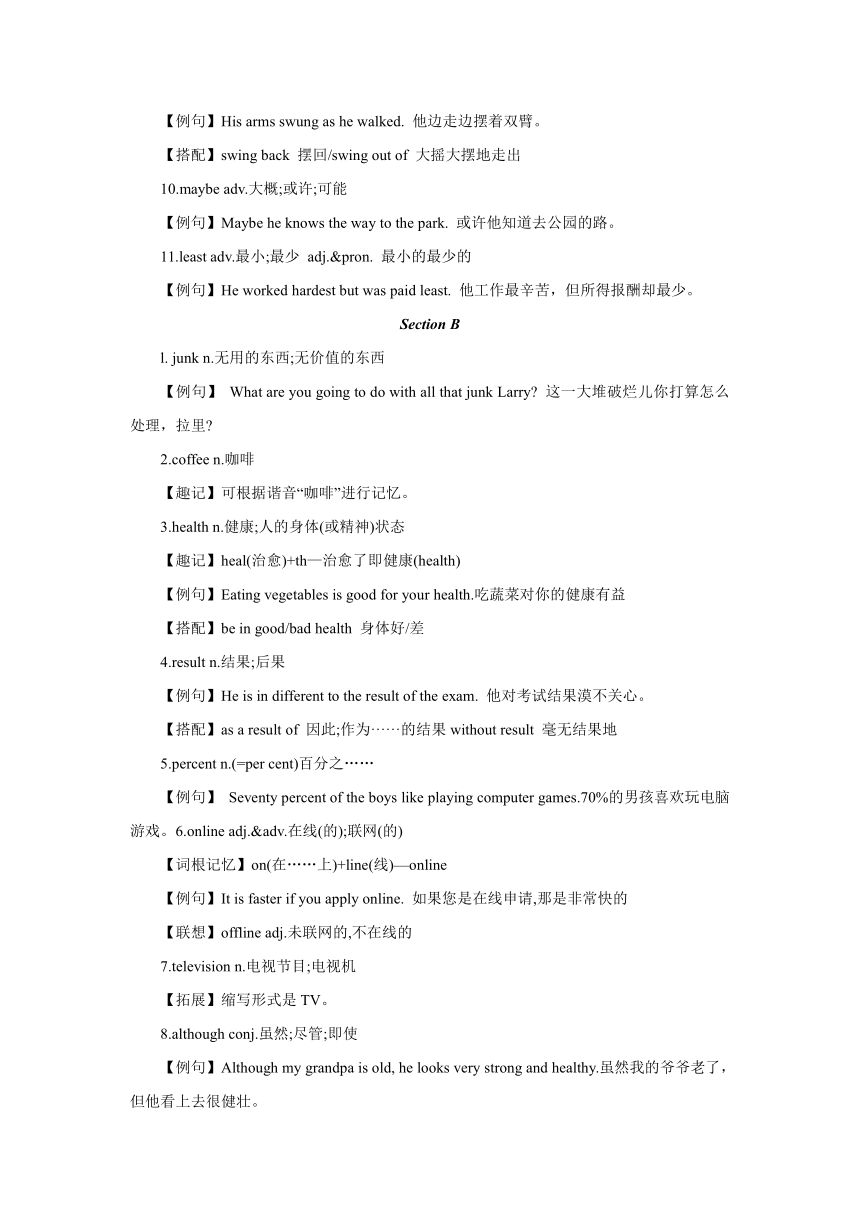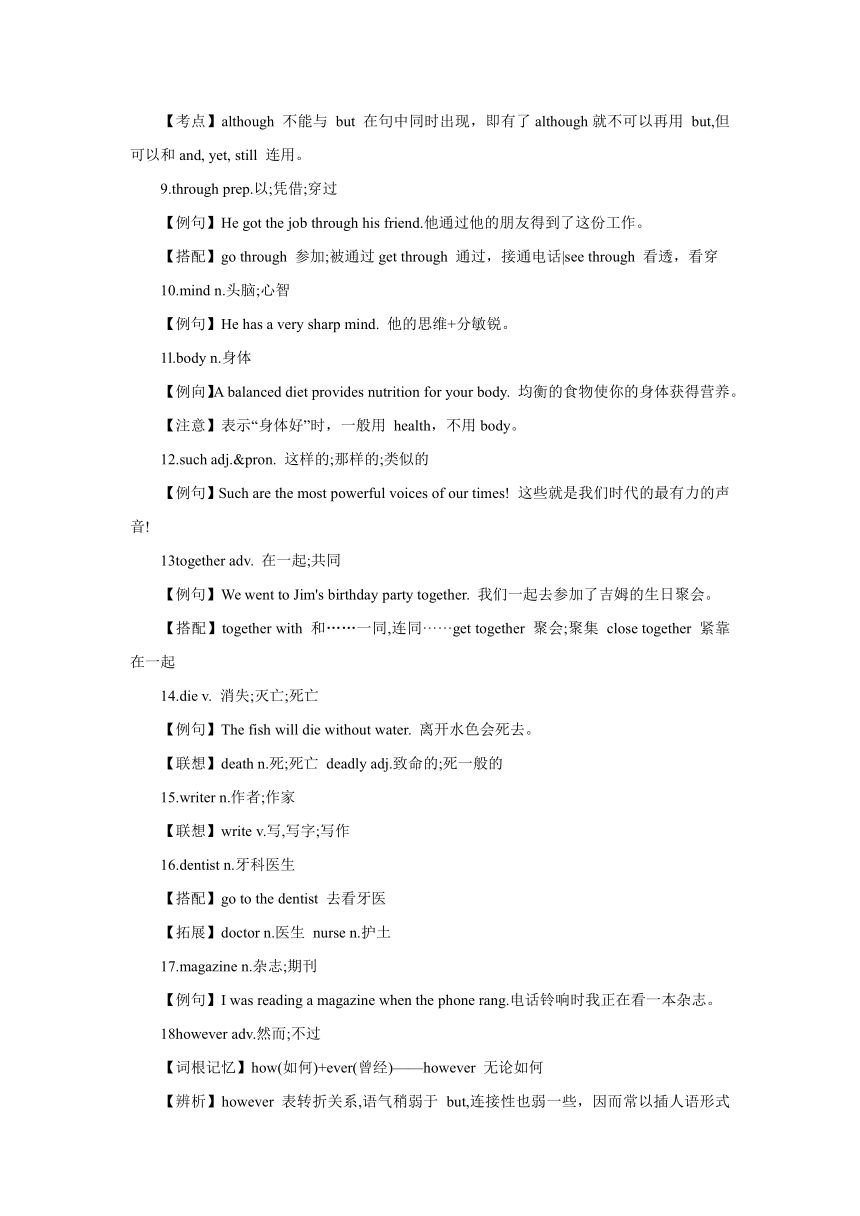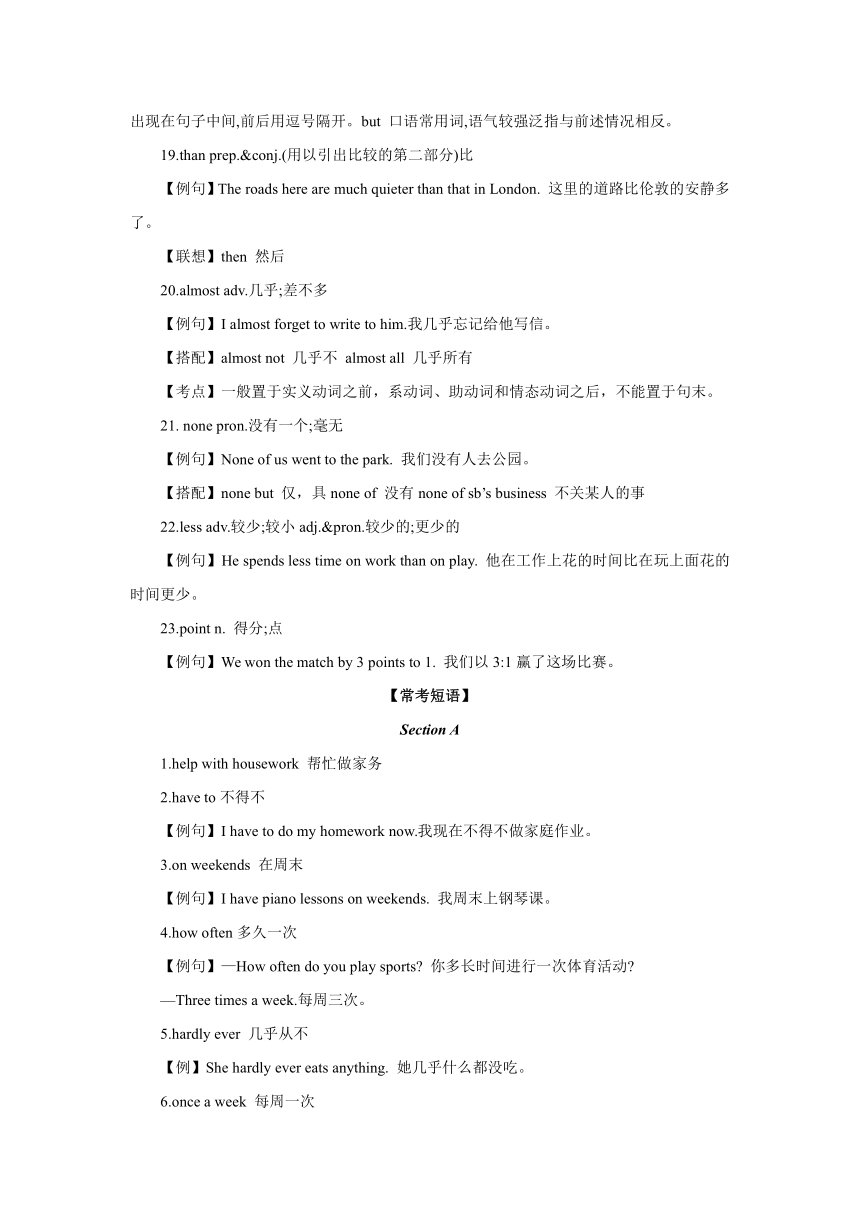人教版八年级上册Unit 2 How often do you exercise?单元复习 导学案
文档属性
| 名称 | 人教版八年级上册Unit 2 How often do you exercise?单元复习 导学案 |  | |
| 格式 | docx | ||
| 文件大小 | 67.4KB | ||
| 资源类型 | 教案 | ||
| 版本资源 | 人教新目标(Go for it)版 | ||
| 科目 | 英语 | ||
| 更新时间 | 2022-12-07 15:51:23 | ||
图片预览




文档简介
Unit 2 单元复习
导学案
【必背单词】
Section A
1.housework n. 家务劳动;家务事
【联想忘记】house(房屋)+ work(工作)—housework
【例句】The boy doesn't like doing housework.这个男孩不喜欢做家务。
【搭配】do housework 做家务
【考点】housework 是不可数名词
2.hardly adv.几乎不;几乎没有
【例句】He is so excited that he can hardly sleep.他如此兴奋,几乎不能人睡
【注意】hardly置于句首时,句子要用倒装结构
3.ever adv. 在任何时候;从来;曾经
【搭配】for ever 永远;总是
4.once adv. 一次;曾经
【例句】He visits his grandparents once a month. 他一个月看望他的祖父母一次。
【搭配】at once立刻once upon a time从前once again 再来一次
5.twice adv.两次;两倍
【例句】I go there twice a week. 我每周去那里两次。
6. Internet n.(国际)互联网;因特网
【词根记忆】可根据谐音“因特网”进行记忆
【搭配】on the Internet 在网上surf the Internet 上网;上网冲浪
7. program n.(=programme) 节目
8.full adj. 忙的;满的;充满的
【例句】Her life is so full that she doesn't have time for hobbies. 她的生活太忙了,以至于她没有时间培养业余爱好。
【搭配】be full of 充满,装满 full name全名;全称
【拓展】(反)empty adj.空的
9.swing n. 摆动;秋千 v.(使)摆动;摇摆
【趣记】挥着(swing)翅膀(wing)的天使
【例句】His arms swung as he walked. 他边走边摆着双臂。
【搭配】swing back 摆回/swing out of 大摇大摆地走出
10.maybe adv.大概;或许;可能
【例句】Maybe he knows the way to the park. 或许他知道去公园的路。
11.least adv.最小;最少 adj.&pron. 最小的最少的
【例句】He worked hardest but was paid least. 他工作最辛苦,但所得报酬却最少。
Section B
l. junk n.无用的东西;无价值的东西
【例句】 What are you going to do with all that junk Larry 这一大堆破烂儿你打算怎么处理,拉里
2.coffee n.咖啡
【趣记】可根据谐音“咖啡”进行记忆。
3.health n.健康;人的身体(或精神)状态
【趣记】heal(治愈)+th—治愈了即健康(health)
【例句】Eating vegetables is good for your health.吃蔬菜对你的健康有益
【搭配】be in good/bad health 身体好/差
4.result n.结果;后果
【例句】He is in different to the result of the exam. 他对考试结果漠不关心。
【搭配】as a result of 因此;作为······的结果without result 毫无结果地
5.percent n.(=per cent)百分之……
【例句】 Seventy percent of the boys like playing computer games.70%的男孩喜欢玩电脑游戏。6.online adj.&adv.在线(的);联网(的)
【词根记忆】on(在……上)+line(线)—online
【例句】It is faster if you apply online. 如果您是在线申请,那是非常快的
【联想】offline adj.未联网的,不在线的
7.television n.电视节目;电视机
【拓展】缩写形式是TV。
8.although conj.虽然;尽管;即使
【例句】Although my grandpa is old, he looks very strong and healthy.虽然我的爷爷老了,但他看上去很健壮。
【考点】although 不能与 but 在句中同时出现,即有了although就不可以再用 but,但可以和and, yet, still 连用。
9.through prep.以;凭借;穿过
【例句】He got the job through his friend.他通过他的朋友得到了这份工作。
【搭配】go through 参加;被通过get through 通过,接通电话|see through 看透,看穿
10.mind n.头脑;心智
【例句】He has a very sharp mind. 他的思维+分敏锐。
1l.body n.身体
【例向】A balanced diet provides nutrition for your body. 均衡的食物使你的身体获得营养。
【注意】表示“身体好”时,一般用 health,不用body。
12.such adj.&pron. 这样的;那样的;类似的
【例句】Such are the most powerful voices of our times! 这些就是我们时代的最有力的声音!
13together adv. 在一起;共同
【例句】We went to Jim's birthday party together. 我们一起去参加了吉姆的生日聚会。
【搭配】together with 和……一同,连同······get together 聚会;聚集 close together 紧靠在一起
14.die v. 消失;灭亡;死亡
【例句】The fish will die without water. 离开水色会死去。
【联想】death n.死;死亡 deadly adj.致命的;死一般的
15.writer n.作者;作家
【联想】write v.写,写字;写作
16.dentist n.牙科医生
【搭配】go to the dentist 去看牙医
【拓展】doctor n.医生 nurse n.护土
17.magazine n.杂志;期刊
【例句】I was reading a magazine when the phone rang.电话铃响时我正在看一本杂志。
18however adv.然而;不过
【词根记忆】how(如何)+ever(曾经)——however 无论如何
【辨析】however 表转折关系,语气稍弱于 but,连接性也弱一些,因而常以插人语形式出现在句子中间,前后用逗号隔开。but 口语常用词,语气较强泛指与前述情况相反。
19.than prep.&conj.(用以引出比较的第二部分)比
【例句】The roads here are much quieter than that in London. 这里的道路比伦敦的安静多了。
【联想】then 然后
20.almost adv.几乎;差不多
【例句】I almost forget to write to him.我几乎忘记给他写信。
【搭配】almost not 几乎不 almost all 几乎所有
【考点】一般置于实义动词之前,系动词、助动词和情态动词之后,不能置于句末。
21. none pron.没有一个;毫无
【例句】None of us went to the park. 我们没有人去公园。
【搭配】none but 仅,具none of 没有none of sb’s business 不关某人的事
22.less adv.较少;较小adj.&pron.较少的;更少的
【例句】He spends less time on work than on play. 他在工作上花的时间比在玩上面花的时间更少。
23.point n. 得分;点
【例句】We won the match by 3 points to 1. 我们以3:1赢了这场比赛。
【常考短语】
Section A
1.help with housework 帮忙做家务
2.have to不得不
【例句】I have to do my homework now.我现在不得不做家庭作业。
3.on weekends 在周末
【例句】I have piano lessons on weekends. 我周末上钢琴课。
4.how often多久一次
【例句】—How often do you play sports 你多长时间进行一次体育活动
—Three times a week.每周三次。
5.hardly ever 几乎从不
【例】She hardly ever eats anything. 她几乎什么都没吃。
6.once a week 每周一次
7.twiceamonth 每月两次
8.go to the movies 去看电影
【例句】I went to the movies last night. 我昨晚去看电影了。
9.every day每天
10.use the Internet 使用因特网
1l.be free有空
【例句】I’ll be free next week. 我下周有空。
12.have dance and piano lessons 上舞蹈课和钢琴课
13.swing dance摇摆舞
【例句】Are you interested in swing dance 你对摇摆舞感兴趣吗
14.play tennis 打网球
15.stay up late 熬夜
【例句】It is not a good habit to stay up late. 熬夜不是一个好习惯。
16.at least 至少;不少于;起码
【例句】There are at least 1,500 students in our school. 我们学校至少有 1500 名学生。
17.go to bed early 早点睡觉
18. play sports进行体育活动
Section B
1.be good for 对……有好处
【例句】 Fresh air and exercise are good for our health. 新鲜空气和运动对我们的健康有益。
2.go camping 去野营
3.in one's free time 在某人的业余时间
4.not...at all 一点儿也不……
【例句】I don't know about it at all. 对那件事我一点儿也不知道。
5.the most popular 最受欢迎的
【例句】Who is the most popular TV star 谁是最受欢迎的电视明星
6.such as 例如;像······这样
【例句】There are many big cities in China,such as Beijing and Shanghai. 中国有许多大城市,比如北京和上海。
7.go to the dentist 去看牙医
8.more than多于
9.less than 少于
【例句】He sleeps less than seven hours every night. 他每晚的睡眠时间不到 7个小时。
10.the answers to....……的答案
【例句】Can you find out the answers to the questions 你能找出这些问题的答案吗
11.go online 去上网
【例句】Sometimes I go online for fun.有时我上网娱乐。
12.teeth cleaning 牙齿清洁
【例句】 Teeth cleaning can help you stay healthy.牙齿清洁可以帮助你保持健康。
13.play computer games 玩电脑游戏
14.spend time with sb和某人度过时光
15.learn about 了解
16.the best way to relax 放松的最好方法
【重点句型】
Section A
1. Well, how about Tuesday 那么,周二怎么样
How about... (=What about... )意为“.....·怎么样 ”,用来向对方征求意见或询问情况。
【例句】I like vegetables. How/What about you 我喜欢蔬菜。你呢
It's sunny today. How/What about playing tennis 今天阳光明媚。去打网球怎么样
【注意】How about,.. /What about,.. 句式中,about后跟名词、代词或动名词形式。
Section B
1. We found that only fifteen percent of our students exercise every day. 我们发现仅有15%的学生每天锻炼。
本句是“find+that 从句”结构
【例句】He found that no one could answer his question. 他发现没有人能回答他的问题。
【拓展】find 作“发现;发觉”讲时,其后可接多种形式的复合结构:
“find+宾语+名词”结构
【例句】We have found him(to be) a good boy. 我们发现他是一个好男孩。
“find+宾语+形容词”结构
【例句】He found the room dirty. 他发现这个房间很脏。
“find+宾语+现在分词”结构
【例句】I found her standing at the door. 我发现她正站在门口。
find it+形容词+(for sb.) to do sth. 结构
【例句】I find it difficult to get there on time. 我发现按时到那儿很难。
【语法总结】
频度副词
频度副词表示动作发生频率的高低,多与一般现在时连用。常见的频度副词(短语)有 sometimes, usually, often, always, ever, never 等。另外,像every day, once a day, twice a week, three times a month, seven or eight times a year 等短语,也表示频率。这些频度副词在频率上的差异如图所示:
1.频度副词的含义always 表示“总是;一直;始终”。(100%)
She always comes late.她总是迟到
usually 表示“通常;经常”。(70%~90%)
I usually go to bed at nine o’clock. 我通常9点钟睡觉。
often表示“常常;经常”。(50%~70%)
We often clean the classroom after school.
我们常常在放学后打扫教室。
sometimes 表示“有时;不时”。(20%~40%)
They sometimes go skiing in winter.
在冬天他们有时会去滑雪。
seldom 表示“很少,不常”。(5%~10%)
She seldom goes out. 她很少外出。
hardly ever 表示“几乎从不;很少;难得”。(5%)
He hardly ever goes to bed before 10 o'clock.
他很少在 10 点之前去睡觉
never 表示“从不;决不”。(0)
She never watches TV. 她从来不看电视
频度副词的位置:
频度副词在句中位于 be动词、助动词、情态动词之后,实义动词之前。但 sometimes 的位置比较灵活,可位于句首、句中或句末,表示频率的短语一般放在句末
I am always busy.我总是很忙。
They often go to school by bus.
他们经常乘公共汽车去上学
Sometimes she has lunch at home.
她有时在家吃午饭。
I go shopping once a week. 我一周去购物一次对频度副词的提问
对频度副词或表频率的短语进行提问时,常用疑问词组 how often。
I hardly ever eat junk food.(对画线部分提问)
_______ ________ do you eat junk food
He watches TV twice a week.(对画线部分提问)
_______ ________ does he watch TV
1 Helen was so excited at the news that she could ________say a word
A. ever B. almost C. hardly D. always
2 Though they are far away from school, the children who live in mountains _______go to school on foot.
A. ever B. always C. never D. hardly ever
3Mid-Autumn Day usually ________in September or October every year.
A. come B. comes C. is coming D. came
导学案
【必背单词】
Section A
1.housework n. 家务劳动;家务事
【联想忘记】house(房屋)+ work(工作)—housework
【例句】The boy doesn't like doing housework.这个男孩不喜欢做家务。
【搭配】do housework 做家务
【考点】housework 是不可数名词
2.hardly adv.几乎不;几乎没有
【例句】He is so excited that he can hardly sleep.他如此兴奋,几乎不能人睡
【注意】hardly置于句首时,句子要用倒装结构
3.ever adv. 在任何时候;从来;曾经
【搭配】for ever 永远;总是
4.once adv. 一次;曾经
【例句】He visits his grandparents once a month. 他一个月看望他的祖父母一次。
【搭配】at once立刻once upon a time从前once again 再来一次
5.twice adv.两次;两倍
【例句】I go there twice a week. 我每周去那里两次。
6. Internet n.(国际)互联网;因特网
【词根记忆】可根据谐音“因特网”进行记忆
【搭配】on the Internet 在网上surf the Internet 上网;上网冲浪
7. program n.(=programme) 节目
8.full adj. 忙的;满的;充满的
【例句】Her life is so full that she doesn't have time for hobbies. 她的生活太忙了,以至于她没有时间培养业余爱好。
【搭配】be full of 充满,装满 full name全名;全称
【拓展】(反)empty adj.空的
9.swing n. 摆动;秋千 v.(使)摆动;摇摆
【趣记】挥着(swing)翅膀(wing)的天使
【例句】His arms swung as he walked. 他边走边摆着双臂。
【搭配】swing back 摆回/swing out of 大摇大摆地走出
10.maybe adv.大概;或许;可能
【例句】Maybe he knows the way to the park. 或许他知道去公园的路。
11.least adv.最小;最少 adj.&pron. 最小的最少的
【例句】He worked hardest but was paid least. 他工作最辛苦,但所得报酬却最少。
Section B
l. junk n.无用的东西;无价值的东西
【例句】 What are you going to do with all that junk Larry 这一大堆破烂儿你打算怎么处理,拉里
2.coffee n.咖啡
【趣记】可根据谐音“咖啡”进行记忆。
3.health n.健康;人的身体(或精神)状态
【趣记】heal(治愈)+th—治愈了即健康(health)
【例句】Eating vegetables is good for your health.吃蔬菜对你的健康有益
【搭配】be in good/bad health 身体好/差
4.result n.结果;后果
【例句】He is in different to the result of the exam. 他对考试结果漠不关心。
【搭配】as a result of 因此;作为······的结果without result 毫无结果地
5.percent n.(=per cent)百分之……
【例句】 Seventy percent of the boys like playing computer games.70%的男孩喜欢玩电脑游戏。6.online adj.&adv.在线(的);联网(的)
【词根记忆】on(在……上)+line(线)—online
【例句】It is faster if you apply online. 如果您是在线申请,那是非常快的
【联想】offline adj.未联网的,不在线的
7.television n.电视节目;电视机
【拓展】缩写形式是TV。
8.although conj.虽然;尽管;即使
【例句】Although my grandpa is old, he looks very strong and healthy.虽然我的爷爷老了,但他看上去很健壮。
【考点】although 不能与 but 在句中同时出现,即有了although就不可以再用 but,但可以和and, yet, still 连用。
9.through prep.以;凭借;穿过
【例句】He got the job through his friend.他通过他的朋友得到了这份工作。
【搭配】go through 参加;被通过get through 通过,接通电话|see through 看透,看穿
10.mind n.头脑;心智
【例句】He has a very sharp mind. 他的思维+分敏锐。
1l.body n.身体
【例向】A balanced diet provides nutrition for your body. 均衡的食物使你的身体获得营养。
【注意】表示“身体好”时,一般用 health,不用body。
12.such adj.&pron. 这样的;那样的;类似的
【例句】Such are the most powerful voices of our times! 这些就是我们时代的最有力的声音!
13together adv. 在一起;共同
【例句】We went to Jim's birthday party together. 我们一起去参加了吉姆的生日聚会。
【搭配】together with 和……一同,连同······get together 聚会;聚集 close together 紧靠在一起
14.die v. 消失;灭亡;死亡
【例句】The fish will die without water. 离开水色会死去。
【联想】death n.死;死亡 deadly adj.致命的;死一般的
15.writer n.作者;作家
【联想】write v.写,写字;写作
16.dentist n.牙科医生
【搭配】go to the dentist 去看牙医
【拓展】doctor n.医生 nurse n.护土
17.magazine n.杂志;期刊
【例句】I was reading a magazine when the phone rang.电话铃响时我正在看一本杂志。
18however adv.然而;不过
【词根记忆】how(如何)+ever(曾经)——however 无论如何
【辨析】however 表转折关系,语气稍弱于 but,连接性也弱一些,因而常以插人语形式出现在句子中间,前后用逗号隔开。but 口语常用词,语气较强泛指与前述情况相反。
19.than prep.&conj.(用以引出比较的第二部分)比
【例句】The roads here are much quieter than that in London. 这里的道路比伦敦的安静多了。
【联想】then 然后
20.almost adv.几乎;差不多
【例句】I almost forget to write to him.我几乎忘记给他写信。
【搭配】almost not 几乎不 almost all 几乎所有
【考点】一般置于实义动词之前,系动词、助动词和情态动词之后,不能置于句末。
21. none pron.没有一个;毫无
【例句】None of us went to the park. 我们没有人去公园。
【搭配】none but 仅,具none of 没有none of sb’s business 不关某人的事
22.less adv.较少;较小adj.&pron.较少的;更少的
【例句】He spends less time on work than on play. 他在工作上花的时间比在玩上面花的时间更少。
23.point n. 得分;点
【例句】We won the match by 3 points to 1. 我们以3:1赢了这场比赛。
【常考短语】
Section A
1.help with housework 帮忙做家务
2.have to不得不
【例句】I have to do my homework now.我现在不得不做家庭作业。
3.on weekends 在周末
【例句】I have piano lessons on weekends. 我周末上钢琴课。
4.how often多久一次
【例句】—How often do you play sports 你多长时间进行一次体育活动
—Three times a week.每周三次。
5.hardly ever 几乎从不
【例】She hardly ever eats anything. 她几乎什么都没吃。
6.once a week 每周一次
7.twiceamonth 每月两次
8.go to the movies 去看电影
【例句】I went to the movies last night. 我昨晚去看电影了。
9.every day每天
10.use the Internet 使用因特网
1l.be free有空
【例句】I’ll be free next week. 我下周有空。
12.have dance and piano lessons 上舞蹈课和钢琴课
13.swing dance摇摆舞
【例句】Are you interested in swing dance 你对摇摆舞感兴趣吗
14.play tennis 打网球
15.stay up late 熬夜
【例句】It is not a good habit to stay up late. 熬夜不是一个好习惯。
16.at least 至少;不少于;起码
【例句】There are at least 1,500 students in our school. 我们学校至少有 1500 名学生。
17.go to bed early 早点睡觉
18. play sports进行体育活动
Section B
1.be good for 对……有好处
【例句】 Fresh air and exercise are good for our health. 新鲜空气和运动对我们的健康有益。
2.go camping 去野营
3.in one's free time 在某人的业余时间
4.not...at all 一点儿也不……
【例句】I don't know about it at all. 对那件事我一点儿也不知道。
5.the most popular 最受欢迎的
【例句】Who is the most popular TV star 谁是最受欢迎的电视明星
6.such as 例如;像······这样
【例句】There are many big cities in China,such as Beijing and Shanghai. 中国有许多大城市,比如北京和上海。
7.go to the dentist 去看牙医
8.more than多于
9.less than 少于
【例句】He sleeps less than seven hours every night. 他每晚的睡眠时间不到 7个小时。
10.the answers to....……的答案
【例句】Can you find out the answers to the questions 你能找出这些问题的答案吗
11.go online 去上网
【例句】Sometimes I go online for fun.有时我上网娱乐。
12.teeth cleaning 牙齿清洁
【例句】 Teeth cleaning can help you stay healthy.牙齿清洁可以帮助你保持健康。
13.play computer games 玩电脑游戏
14.spend time with sb和某人度过时光
15.learn about 了解
16.the best way to relax 放松的最好方法
【重点句型】
Section A
1. Well, how about Tuesday 那么,周二怎么样
How about... (=What about... )意为“.....·怎么样 ”,用来向对方征求意见或询问情况。
【例句】I like vegetables. How/What about you 我喜欢蔬菜。你呢
It's sunny today. How/What about playing tennis 今天阳光明媚。去打网球怎么样
【注意】How about,.. /What about,.. 句式中,about后跟名词、代词或动名词形式。
Section B
1. We found that only fifteen percent of our students exercise every day. 我们发现仅有15%的学生每天锻炼。
本句是“find+that 从句”结构
【例句】He found that no one could answer his question. 他发现没有人能回答他的问题。
【拓展】find 作“发现;发觉”讲时,其后可接多种形式的复合结构:
“find+宾语+名词”结构
【例句】We have found him(to be) a good boy. 我们发现他是一个好男孩。
“find+宾语+形容词”结构
【例句】He found the room dirty. 他发现这个房间很脏。
“find+宾语+现在分词”结构
【例句】I found her standing at the door. 我发现她正站在门口。
find it+形容词+(for sb.) to do sth. 结构
【例句】I find it difficult to get there on time. 我发现按时到那儿很难。
【语法总结】
频度副词
频度副词表示动作发生频率的高低,多与一般现在时连用。常见的频度副词(短语)有 sometimes, usually, often, always, ever, never 等。另外,像every day, once a day, twice a week, three times a month, seven or eight times a year 等短语,也表示频率。这些频度副词在频率上的差异如图所示:
1.频度副词的含义always 表示“总是;一直;始终”。(100%)
She always comes late.她总是迟到
usually 表示“通常;经常”。(70%~90%)
I usually go to bed at nine o’clock. 我通常9点钟睡觉。
often表示“常常;经常”。(50%~70%)
We often clean the classroom after school.
我们常常在放学后打扫教室。
sometimes 表示“有时;不时”。(20%~40%)
They sometimes go skiing in winter.
在冬天他们有时会去滑雪。
seldom 表示“很少,不常”。(5%~10%)
She seldom goes out. 她很少外出。
hardly ever 表示“几乎从不;很少;难得”。(5%)
He hardly ever goes to bed before 10 o'clock.
他很少在 10 点之前去睡觉
never 表示“从不;决不”。(0)
She never watches TV. 她从来不看电视
频度副词的位置:
频度副词在句中位于 be动词、助动词、情态动词之后,实义动词之前。但 sometimes 的位置比较灵活,可位于句首、句中或句末,表示频率的短语一般放在句末
I am always busy.我总是很忙。
They often go to school by bus.
他们经常乘公共汽车去上学
Sometimes she has lunch at home.
她有时在家吃午饭。
I go shopping once a week. 我一周去购物一次对频度副词的提问
对频度副词或表频率的短语进行提问时,常用疑问词组 how often。
I hardly ever eat junk food.(对画线部分提问)
_______ ________ do you eat junk food
He watches TV twice a week.(对画线部分提问)
_______ ________ does he watch TV
1 Helen was so excited at the news that she could ________say a word
A. ever B. almost C. hardly D. always
2 Though they are far away from school, the children who live in mountains _______go to school on foot.
A. ever B. always C. never D. hardly ever
3Mid-Autumn Day usually ________in September or October every year.
A. come B. comes C. is coming D. came
同课章节目录
- Unit 1 Where did you go on vacation?
- Section A
- Section B
- Unit 2 How often do you exercise?
- Section A
- Section B
- Unit 3 I'm more outgoing than my sister.
- Section A
- Section B
- Unit 4 What's the best movie theater?
- Section A
- Section B
- Unit 5 Do you want to watch a game show?
- Section A
- Section B
- Unit 6 I'm going to study computer science.
- Section A
- Section B
- Unit 7 Will people have robots?
- Section A
- Section B
- Unit 8 How do you make a banana milk shake?
- Section A
- Section B
- Unit 9 Can you come to my party?
- Section A
- Section B
- Unit 10 If you go to the party, you'll have a grea
- Section A
- Section B
